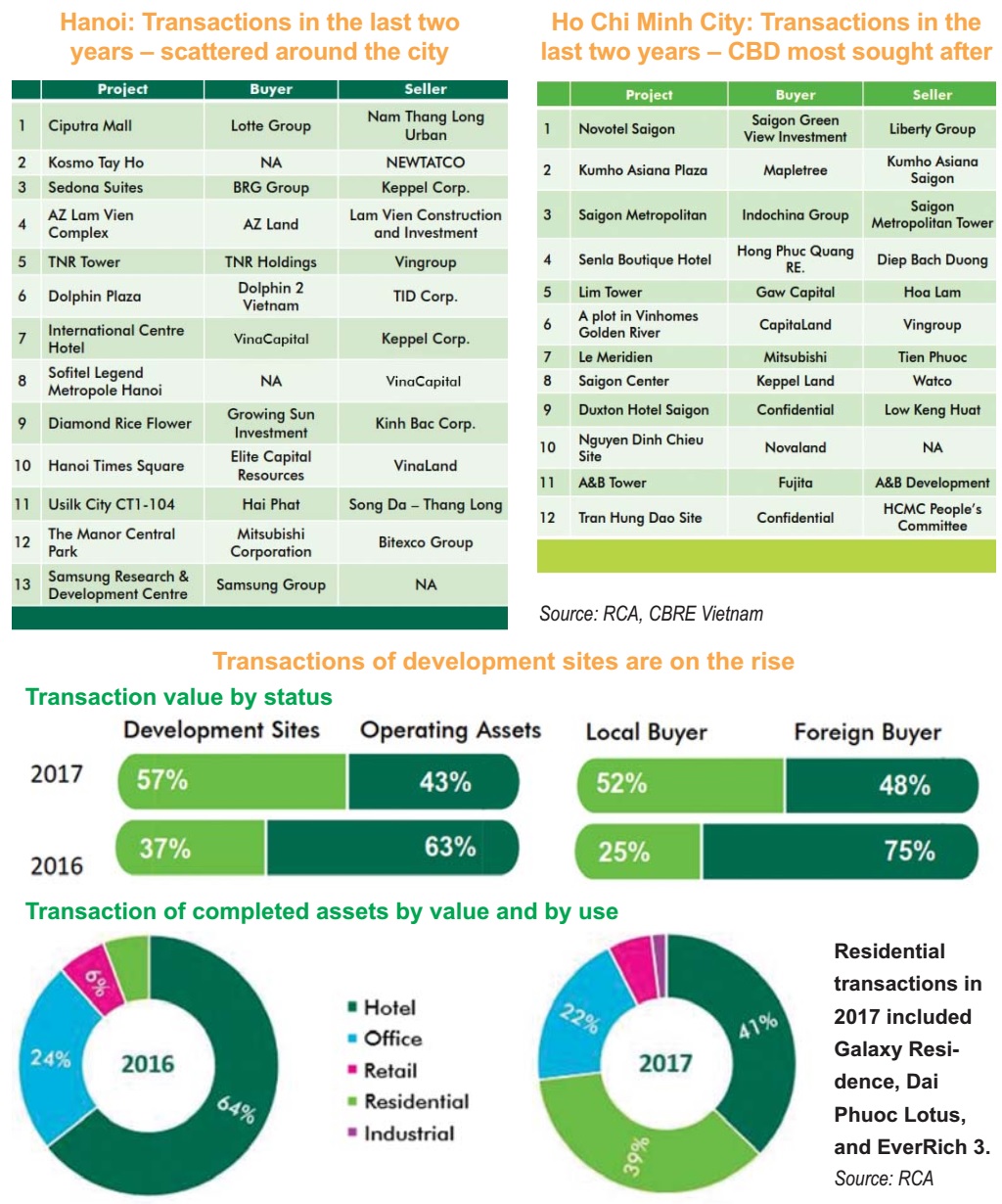City real estate at $2 billion volume
 |
According to Adam Fitzpatrick, director of advisory and transactions and investment properties at CBRE Vietnam, residential projects are still sought after by many foreign investors.
CapitaLand, Mitsubishi, and Keppel Land are just some of the big names involved in a range of large-scale projects of this kind in Vietnam.
“We can read the growth rate of mergers and acquisitions (M&A) in Vietnam by looking at the initial public offering activities and the growth rate of private equities, which have been more active recently. We expect that this trend will continue throughout the next several years,” said Fitzpatrick.
In the past two years, unlike a majority of transactions in Ho Chi Minh City, which were focused on the central business districts, those in Hanoi are mostly taking place in decentralised areas. Ho Chi Minh City made up three quarters of the aforementioned $2 billion.
Investment transactions in Vietnam, said Fitzpatrick, are still low due to remaining challenges such as the poor-quality valuation as well as the lack of transparency, structuring, and track records.
As for the rest of Vietnam, 75 per cent of transaction value stems from Hanoi and Ho Chi Minh City.
While many different types of assets are put into transaction, development sites are experiencing rising interest.
According to the recent survey ‘Emerging trends in real estate, Asia Pacific 2018’ by PwC, which surveyed 600 respondents including investors, fund managers, developers, property companies, lenders, brokers, advisors, and consultants, Ho Chi Minh City was ranked among the top ten investment and development prospects.
The report ranked Ho Chi Minh City in fifth position on the list with a verdict of “generally good” in investment prospects. Only five countries were ranked in the category of “generally good”.
Ho Chi Minh City also ranked second in development prospects, trailing only Sydney. Only three countries were ranked “generally good” in this category.
Vietnam was ranked the most popular developing market and continues to draw interest, according to the report.
In previous reports by PwC, a succession of cities in emerging markets – in particular Bangalore, Jakarta, and Manila – reached top positions in investment prospect rankings. This year, only one – Ho Chi Minh City – stood out, as enthusiasm elsewhere declined.
Notably, PwC’s survey ranked Ho Chi Minh City among the highest in terms of rental value growth, reflecting confidence that economic strength will spill over to property values.
Unsurprisingly, Vietnam remains very much a development story, although the number and size of opportunities tend to be relatively small. Most investors are focused on the residential sector. Home sales and pricing have been strong over the last three years, but in a volatile market there are signs the cycle may be peaking.
“Very little prime office stock has been built in recent years, meaning very few stabilised assets are available to buy. That leaves the residential segment as the default play for most investors, usually in conjunction with a local joint venture partner,” the report said.
“There’s been a general economic recovery, but asset levels have not lifted to pre-global financial crisis levels as they have in other markets. So we see strong growth prospects from a macro-economic perspective. Our entry point is mid- to affordably-priced residential housing, which is very demand-based. That’s a strategy we’re banking on now,” said a fund manager who wished not to be named.
In Vietnam, investors continue to draw favourable comparisons to China 10-15 years ago. GDP growth is in the area of 7.4 per cent and while bureaucracy continues to be a hurdle, the regulatory environment is slowly becoming less restrictive.
PwC’s experts also regard Vietnam as being similar to China, now having “a wave of money swilling around,” as large regional developers and an increasing number of private equity funds take the bet that the country will offer up a repeat of the mainland China experience in terms of property price inflation.
“Bureaucracy remains an issue, but restrictions are slowly being eased and Vietnam today probably offers better market access than other developing economies in Southeast Asia do. It remains a favourite of investors from South Korea and Japan,” according to the report.
2017 has been a stellar year in both the quantity and the quality of M&As in the property sector. A range of large-scale transactions were undertaken by domestic investors including Phat Dat Real Estate Company, An Gia Real Estate Company, Novaland, Sungroup, Vingroup, and many others.
Foreign investors have also been participating in M&A activities. Notable investors are Mapletree, Keppel Land, Frasers Centrepoint, Hongkong Land, Lotte E&C, and others.
In 2017, real estate was one of the top five sectors attracting foreign direct investment in Vietnam. The five largest investors into Vietnam were South Korea, Japan, Singapore, mainland China, and Taiwan.
What the stars mean:
★ Poor ★ ★ Promising ★★★ Good ★★★★ Very good ★★★★★ Exceptional
Latest News
More News
- Real estate investment trusts pivotal for long-term success (February 02, 2026 | 11:09)
- Dong Nai experiences shifting expectations and new industrial cycle (January 28, 2026 | 09:00)
- An Phat 5 Industrial Park targets ESG-driven investors in Hai Phong (January 26, 2026 | 08:30)
- Decree opens incentives for green urban development (January 24, 2026 | 11:18)
- Public investment is reshaping real estate’s role in Vietnam (January 21, 2026 | 10:04)
- Ho Chi Minh City seeks investor to revive Binh Quoi–Thanh Da project (January 19, 2026 | 11:58)
- Sun Group launches construction of Rach Chiec sports complex (January 16, 2026 | 16:17)
- CEO Group breaks ground on first industrial park in Haiphong Free Trade Zone (January 15, 2026 | 15:47)
- BRIGHTPARK Entertainment Complex opens in Ninh Binh (January 12, 2026 | 14:27)
- Ho Chi Minh City's industrial parks top $5.3 billion investment in 2025 (January 06, 2026 | 08:38)

















 Mobile Version
Mobile Version